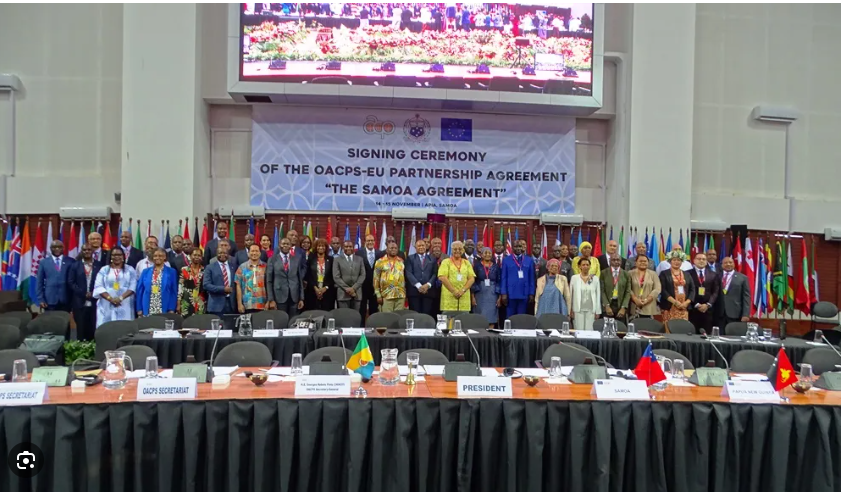Jamaica should forgo the Samoa Agreement based on the EU lack of credibility to enforce human rights and conflict with gender issues
The new Samoa Agreement is said to be a partnership agreement that will serve as the new legal framework for EU relations with 79 countries. This includes 47 African, 16 Caribbean and 15 Pacific countries, and the Republic of Maldives.
According to the European Council of the European Union website, the Samoa agreement is the overarching framework for EU relations with African, Caribbean and Pacific countries.
It lays down common principles and covers the following six priority areas:
- democracy and human rights
- sustainable economic growth and development
- climate change
- human and social development
- peace and security
- migration and mobility
Critics argues that the European Union has lost any credibility to be the master and judge of human rights especially in the wake of the atrocities in Gaza.
Given the recent events in the Palestinian region, particularly in Gaza, the European Union (EU) stands in a position of questionable credibility in terms of its ability to enforce the basic rights enshrined in the Samoa Agreement. The EU-Israel relationship has exposed a seeming reluctance on the part of the EU to hold Israel accountable despite evident disregard for human rights and democratic values.

It has been reported that at least 11,240 Palestinians have been killed, including 4,630 children and 3,130 women in Gaza by the Israeli military since 7 October.
The nonchalant attitude of the EU towards the rights violation faced by the Palestinians, namely, the attacks on Gaza and the raids on the offices of Palestinian NGOs escalates the concern. Yet, the EU continues to maintain its diplomatic ties with Israel. The EU-Israel Association Agreement prioritizing “human rights and democracy” seems to stand contradicted in the given context.
In regarding the 5th Principle of the Samoa Agreement on “peace and security“, the EU and Israel’s responsibility under the Action Plan towards the Palestinian Authority (PA) reflect an underlying assumption that Palestinians are more of a hindrance to peace and stability than any other party.
Given these observations, it seems rational for Jamaica to reconsider signing the Samoa Agreement as sublicensed through the EU. The inefficiency of the EU in holding Israel accountable in the Israel-Palestine conflict does call into question the EU’s intentions and ability in protecting and promoting human rights and democratic principles globally.
Additionally, in response to the new *Samoa Agreement* signed by the European Union with the 79-member Organisation of African, Caribbean and Pacific States (OACPS), concerns have arisen within Jamaica regarding its imminent signing of the agreement. The Jamaica Coalition for a Healthy Society, led by Advocacy Officer Philippa Davies, has voiced its apprehension about the undefined human rights obligations that the deal would imply, potentially leading to trade sanction.

Davies and her team have consistently sought clarity from the Foreign Affairs Ministry regarding the interpretation and application of terms such as human rights, gender, sexual and reproductive health and rights, hate speech and non-discrimination, especially in the context of this new agreement. The group has been advocating for a public statement that clearly outlines the Jamaican government’s stance on these topics, and how they differ or align with the European Union’s definitions.
The core of the debate appears to revolve around the interpretation of the term ‘gender’. Davies asserts that while the European Union defines gender in terms inclusive of transgender individuals, Jamaican law aligns with a binary definition based on biological sex. Narcisse concedes to this, highlighting that national laws are the guiding principle. Regardless, Davies maintains the importance of the government defining these terms and outlining its position clearly. As such, criticism remains as to whether Jamaica should proceed with signing the Samoa Agreement.
In an article, Not for sale, by the Jamaica Observer, The Jamaica Coalition for a Healthy Society JCHS, in praising the Government’s decision to stand down on ratifying the new African Caribbean and Pacific ACP-EU agreement, the Samoa Agreement, on November 15, says while it knows the financial gains derived from being party to various European Union EU pacts, the country cannot afford to barter its sovereignty and children for money.
“We understand that, and we understand the pickle that the Government is in. But, nonetheless, it is good to say we reserve, because what we would be doing is handing over our sovereignty and our future and our children’s future to these people for money. We must be able to say we don’t agree with this,” head of the JCHS Dr Wayne West told the Jamaica Observer on Sunday.

“We are not against trade, we are all for trade, but these types of things have never been linked to this agreement before, and this is a new strategy by the EU. This agreement has been from the days of Michael Manley, but the EU is now introducing this social, ideological component, imposing [it] on the ACP countries. So we hope that other ACP countries will say let’s do trade, but we won’t be part of that,” he continued.
“The reality is that if we allow the EU to get away with what they want, parents will lose control over their children from the time they get to school, because the children are going to be indoctrinated in the schools about these various ideologies about being transgender and LGBTQ, and just generally having a nihilistic approach to sexuality. So this is one of the objectives of that agreement: They want to indoctrinate, educate, and force into the children these things,” the JCHS head warned. Jamaica Observer
To conclude, this should make a strong case for the government of Jamaica to revisit the decision of signing the Samoa Agreement, at least until the EU restores its credibility in the sphere of human rights and democracy.
